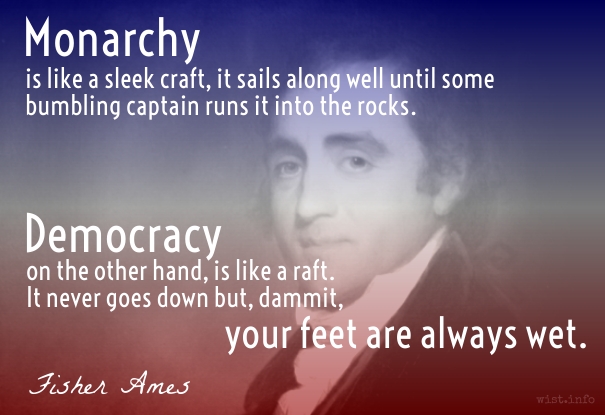Liberty, under every conceivable Form of Government is always in Danger. It is so even under a simple, or perfect Democracy, more so under a mixed Government, like the Republic of Rome, and still more so under a limited Monarchy.
John Adams (1735-1826) American lawyer, Founding Father, statesman, US President (1797-1801)
Diary (1772, Spring), “Notes for a Oration at Braintree”
(Source)
Quotations about:
aristocracy
Note not all quotations have been tagged, so Search may find additional quotes on this topic.
Sometimes Kings have courted the People in Opposition to the Nobles. At other Times the Nobles have united with the People in Opposition to Kings. But Kings and Nobles have much oftener combined together, to crush, to humble and to Fleece the People.
John Adams (1735-1826) American lawyer, Founding Father, statesman, US President (1797-1801)
Diary (1772, Spring), “Notes for a Oration at Braintree”
(Source)
Rank without merit earns deference without respect.
[L’importance sans mérite obtient des égards sans estime.]
Nicolas Chamfort (1741-1794) French writer, epigrammist (b. Nicolas-Sébastien Roch)
Products of Perfected Civilization [Produits de la Civilisation Perfectionée], Part 1 “Maxims and Thoughts [Maximes et Pensées],” ch. 1, ¶ 60 (1795) [tr. Merwin (1969)]
(Source)
(Source (French)). Alternate translations:Eminence without merit earns deference without esteem.
[tr. Mathers (1926)]Being important without merit attracts consideration without esteem.
[tr. Siniscalchi (1994)]
In short, the contradiction in the old defense of class stratification is that it defends leisure for the leisure class, but not for the underclass. With reference to the underclass, leisure is said to destroy the incentive to work, leads to slothfulness and self-indulgence, and retards cognitive and moral development. When applied to the leisure class, the concept evokes an image of Plato and Aristotle, whose leisure was based on slave labor, creating the intellectual foundations of Western civilization; or patrician slave-owners like Washington and Jefferson laying the foundations of American civilization; or creative aristocrats like Count Leo Tolstoy or Bertrand, Earl Russell; or, even closer to home, of our own sons and daughters (or of ourselves, when we were young adults) being freed from the stultifying tasks of earning a living until well into our adult years so that we could study in expensive universities to gain specialized knowledge and skills.
James Gilligan (b. c. 1936) American psychiatrist and author
Preventing Violence, ch. 5 (2001)
(Source)
It is in vain to Say that Democracy is less vain, less proud, less selfish, less ambitious or less avaricious than Aristocracy or Monarchy. It is not true in Fact and no where appears in history. Those Passions are the same in all Men under all forms of Simple Government, and when unchecked, produce the same Effects of Fraud Violence and Cruelty. When clear Prospects are opened before Vanity, Pride, Avarice or Ambition, for their easy gratification, it is hard for the most considerate Phylosophers and the most conscientious Moralists to resist the temptation. Individuals have conquered themselves, Nations and large Bodies of Men, never.
John Adams (1735-1826) American lawyer, Founding Father, statesman, US President (1797-1801)
Letter (1814-12-17) to John Taylor
(Source)
These women were fatuous with a fatuity which had threatened her all her life, as it threatened all people of means, and which was of mournful significance for humanity in general, since it proved the emptiness of one of man’s most reasonable expectations. No more sensible form of government could be imagined than aristocracy. If certain able stocks in the community were able to amass enough wealth to give their descendants beautiful houses to grow up in, the widest opportunities of education, complete economic security, so that they need never be influenced by mercenary considerations, and easy access to any public form of work they chose to undertake — why, then, the community had a race of perfect governors ready made.
Only, as the Lauristons showed, the process worked out wholly different in practice. There came to these selected stocks a deadly, ungrateful complacence, which made them count these opportunities as their achievements, and belittle everybody else’s achievements unless they were similarly confused with opportunities; and which did worse than this, by abolishing all standards from their minds except what they themselves were and did.
I believe in aristocracy, though — if that is the right word, and if a democrat may use it. Not an aristocracy of power, based upon rank and influence, but an aristocracy of the sensitive, the considerate and the plucky. Its members are to be found in all nations and classes, and all through the ages, and there is a secret understanding between them when they meet. They represent the true human tradition, the one permanent victory of our queer race over cruelty and chaos. Thousands of them perish in obscurity, a few are great names. They are sensitive for others as well as for themselves, they are considerate without being fussy, their pluck is not swankiness but the power to endure, and they can take a joke.
Because a body of men holding themselves accountable to nobody, ought not to be trusted by anybody.
Thomas Paine (1737-1809) American political philosopher and writer
Rights of Man (1791)
(Source)
Reason Four why an aristocratic body of hereditary legislators (such as the United Kingdom's House of Lords) is a bad idea.
In reality, the likelihood of reaching the pinnacle of capitalist society today is only marginally better than were the chances of being accepted into the French nobility four centuries ago, though at least an aristocratic age was franker, and therefore kinder, about the odds. It did not relentlessly play up the possibilities open to all, … and so, in turn, did not cruelly equate an ordinary life with a failed one.
Alain de Botton (b. 1969) Swiss-British author
The Pleasures and Sorrows of Work, ch. 9 “Entrepreneurship” (2009)
(Source)
The surface of American society is, if I may use the expression, covered with a layer of democracy, from beneath which the old aristocratic colors sometimes peep.
Alexis de Tocqueville (1805-1859) French writer, diplomat, politician
Democracy in America, ch. 2 (1835) [tr. Reeve (1899)]
(Source)Alt. trans.:
- As above, but given as "... sometimes seep."
- "American society, if I may put it this way, is like a painting that is democratic on the surface but from time to time allows the old acistocratic colors to peep through." [tr. Goldhammer (2004)]
- "The surface of American society is covered with a layer of democratic paint, but from time to time one can see the old aristocratic colors breaking through."
I do not say that Democracy has been more pernicious, on the whole, and in the long run, than Monarchy or Aristocracy. Democracy has never been and never can be so durable as Aristocracy or Monarchy. But while it lasts it is more bloody than either. […] Remember Democracy never lasts long. It soon wastes exhausts and murders itself. There never was a Democracy Yet, that did not commit suicide.
John Adams (1735-1826) American lawyer, Founding Father, statesman, US President (1797-1801)
Letter (1814-12-17) to John Taylor
(Source)
Monarchy is like a sleek craft, it sails along well until some bumbling captain runs it into the rocks. Democracy, on the other hand, is like a raft. It never goes down but, dammit, your feet are always wet.
Fisher Ames (1758-1808) American politician, orator
(Attributed)
This is the earliest reference I can find to this metaphor. Variants:
- "A monarchy is a merchantman which sails well, but will sometimes strike on a rock and go to the bottom; a republic is a raft which will never sink, but then your feet are always in the water." This variant is often attributed to a speech in the House of Representatives in 1795, but is not found in records of Ames' speeches.
- "A monarchy is like a man-of-war -- bad shots between wind and water hurt it exceedingly; there is danger of capsizing. But democracy is a raft. You cannot easily overturn it. It is a wet place, but it is a pretty safe one." -- Joseph Cook (1860-1947) Anglo-Australian politician
- "Dictatorship is like a big proud ship -- steaming away across the ocean with a great hulk and powerful engines driving it. It’s going fast and strong and looks like nothing could stop it. What happens? Your fine ship strikes something -- under the surface. Maybe it’s a mine or a reef, maybe it’s a torpedo or an iceberg. And your wonderful ship sinks. Now take democracy. It’s like riding on a raft, a rickety raft that was put together in a hurry. We get tossed about on the waves, it’s bad going and our feet are always wet. But that raft doesn’t sink … It’s the raft that will get to the shore at last." --- Roaldus Richmond (fl. 1940) American writer. In, ed., "A Yankee Businessman in New Hampshire," American Life Histories: Manuscripts from the Federal Writers Project, 1936-1940.
- "Democracy is like a raft: It won't sink, but you will always have your feet wet." -- Russell B. Long (1918-2003) American politician
- "But you have to understand, American democracy is not like the system you have. We're not an ocean liner that sails across the ocean from point A to point B at 30 knots. That's not American democracy. American democracy is kind of like a life raft that bobs around the ocean all the time. Your feet are always wet. Winds are always blowing. You're cold. You're wet. You're uncomfortable -- but you never sink." -- Colin Powell (b. 1937) American politician, diplomat, soldier
The fundamental Article of my political Creed is, that Despotism, or unlimited Sovereignty, or absolute Power is the Same in a Majority of a popular Assembly, an Aristocratical Counsel, an Oligarchical Junto and a Single Emperor. Equally arbitrary cruel bloody and in every respect, diabolical.
John Adams (1735-1826) American lawyer, Founding Father, statesman, US President (1797-1801)
Letter (1815-11-13) to Thomas Jefferson
(Source)











